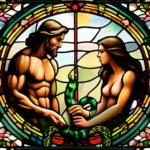Exploring the Evolution and Relevance of the Concept of Sin in Modern Society
In this article, we delve into the intriguing question: is the concept of sin outdated? We’ll examine its historical roots, contemporary interpretations, and the role it plays in shaping our moral compass today.
The Historical Roots of Sin
Imagine tracing back the origins of sin, much like following the winding path of a river that carves through history. The concept of sin has its roots deeply embedded in ancient religions, with each faith adding layers to this complex tapestry.
In Judaism, for instance, sin is often seen as transgressions against God’s commandments, with the idea of a covenant between man and his creator playing a crucial role. The Ten Commandments serve as a clear guide, delineating behaviors deemed sinful. Here, sin is not just about moral failings but also about breaking one’s relationship with the divine.
But how did this concept evolve in Christianity? Christianity expanded on the notion of sin by introducing the idea of original sin—Adam and Eve’s disobedience marking a starting point for all humans. This concept shifted focus to not just actions but also thoughts, making every human inherently flawed before God. The cross becomes a symbol of redemption from this inherited guilt.
In Hinduism, the concept is more nuanced. Sin (Pāpa) is often seen as part of the cycle of karma and rebirth. Actions have consequences, but they are not always meted out in this life. The path to liberation lies in understanding and balancing these actions through dharma or duty.
Each religion’s take on sin reflects its unique worldview, shaping moral codes that guide behavior and belief. But as we navigate the modern world, how do these ancient concepts hold up? Are they still relevant, or are we entering an era where sin is outdated?
The journey through history shows a rich evolution of what sin means, but in our fast-paced, secular societies, new questions arise: Do we still need to label behaviors as sinful when morality can be so subjective? How do contemporary interpretations adapt these ancient ideas to fit today’s complex ethical landscapes?
Contemporary Interpretations of Sin
As we delve into contemporary interpretations of sin, it’s essential to ask: How do modern societies view and apply this concept? In today’s world, where technology and social norms evolve rapidly, traditional religious teachings on sin often clash with secular values and lifestyles.
Is sin a relic of the past, or does it still hold relevance in our lives? Many contemporary interpretations of sin have become more nuanced. For instance, in some religions, sins like envy, greed, and pride are still considered cardinal, but their application is often contextualized within modern societal norms.
In secular contexts, concepts similar to sin can be found in ethical frameworks such as utilitarianism or deontological ethics. These frameworks might not use the term ‘sin,’ but they certainly address behaviors that harm others or oneself. Are these ethical dilemmas and moral lapses just different names for the same concept?
One interesting aspect to explore is how contemporary societies often categorize actions as ‘morally wrong’ based on societal consensus rather than religious doctrine. For example, environmental degradation, animal cruelty, or digital privacy violations are now widely condemned, even without direct reference to a divine code.
Another perspective comes from psychology and sociology, where behaviors that deviate significantly from social norms can be labeled as ‘immoral.’ Here, the line between sin and social deviance is often blurred. Is it fair to label all socially unacceptable behaviors as sins?
The concept of sin has also evolved in terms of its impact on personal growth and self-reflection. Many individuals find that acknowledging their flaws and working towards improvement provides a sense of spiritual or psychological fulfillment, regardless of religious affiliation.
In essence, while the traditional concept of sin may seem outdated to some, it continues to influence our understanding of morality and ethics in profound ways. The question remains: How can we reconcile these ancient concepts with modern realities?
The Role of Sin in Shaping Morality
Is the concept of sin outdated? Is it still relevant to guide our moral compass in today’s complex world, where societal norms and individual behaviors often diverge? Sin has been a cornerstone in many religious teachings for centuries, serving as a yardstick for right and wrong actions. But is this concept now merely a relic of a bygone era?
Imagine sin as a lighthouse guiding ships through stormy seas; it once provided clear direction, but what if the waters have shifted? In contemporary society, we face ethical dilemmas that were not even imagined in earlier times—cyber ethics, genetic engineering, and artificial intelligence are just a few examples. How do these new challenges fit into the traditional framework of sin?
Many argue that while sin still carries weight in religious communities, its universal application is questionable. The definition of what constitutes a “sin” can vary widely based on cultural, social, and personal beliefs. For instance, something considered sinful in one society might be deemed acceptable in another. This variability challenges the idea of an absolute moral code rooted solely in sin.
Consider the role of empathy and compassion in shaping our moral behavior. Does sin adequately capture these nuanced emotions? Emotions like guilt and shame can certainly prompt ethical actions, but they are not always aligned with traditional notions of sin. Perhaps a more fluid approach to morality is needed—one that embraces personal growth and continuous learning rather than rigid adherence to predefined sins.
Is the concept of sin too narrow to encompass the complexities of modern life? As society evolves, so must our understanding of right and wrong. The role of sin in shaping our moral compass might be diminishing as we seek more inclusive and flexible ethical frameworks that can adapt to a rapidly changing world.
Challenges to Traditional Notions of Sin
Is the concept of sin outdated? As we delve into this question, it’s crucial to explore how different philosophical and social movements challenge traditional notions of sin in modern society. One such movement is secular humanism, which emphasizes rational thought and ethical behavior based on human needs and values rather than divine commandments.
Imagine a world where the concept of sin has been replaced by a focus on individual autonomy and rights. In this realm, would the idea of sin still hold relevance? Secular humanists argue that moral norms should be derived from human experiences and societal benefits, not dictated by religious doctrine or supernatural forces.
- How can we define morality without relying on the concept of sin?
- Would societies thrive if they abandoned traditional concepts of right and wrong?
Existentialism further complicates our understanding of sin. This philosophical movement emphasizes personal freedom, choice, and responsibility. For existentialists, authenticity is key—living a life that aligns with one’s true self rather than conforming to societal expectations or religious mandates.
In this context, the question arises: Can one truly be authentic by embracing traditional notions of sin? Or does such adherence merely reflect a lack of genuine personal freedom and choice?
- Do existentialists view sin as a necessary evil for moral development?
- How do existentialists propose we navigate ethical dilemmas without the framework of sin?
Postmodernism, with its critique of grand narratives and dominant cultural norms, further erodes traditional concepts of sin. This movement questions the idea that there is a single, objective truth or morality. Instead, it emphasizes the plurality of perspectives and the constructed nature of moral norms.
Does this mean that sin is merely a social construct without inherent meaning? If so, how do we establish ethical boundaries in a world where traditional moral frameworks are questioned? Can we still maintain a sense of right and wrong if they are not grounded in religious or philosophical absolutes?
- How does postmodernism’s critique impact our understanding of sin?
- Can alternative perspectives reshape our concept of morality to be more inclusive and adaptive?
As we navigate these challenges, it becomes evident that the concept of sin is far from outdated. While traditional religious frameworks may offer clear-cut answers, modern philosophies like secular humanism, existentialism, and postmodernism prompt us to reevaluate our moral compass in light of individual freedom, authenticity, and social construct.
The Debate: Is Sin Outdated?
Is sin outdated? This question has been bouncing around philosophical and religious circles for centuries, much like a pebble thrown into a calm lake. On one hand, some argue that traditional concepts of sin are no longer relevant in today’s complex world. They see it as an outdated notion that doesn’t fit the secular humanism or the existential freedom of modern life. But is sin really just a relic of a bygone era?
One argument against the idea that sin has become obsolete lies in its role as a moral compass. Critics argue that without the concept of sin, individuals might lose their ethical anchors in a world increasingly dominated by self-interest and materialism. Is it truly better to be free from constraints or is there something to be said for having boundaries? Some philosophers suggest that a society without any notion of sin risks becoming amoral, where anything goes as long as it brings personal happiness or profit.
On the other hand, proponents of letting go of traditional ideas of sin point out that modern life is far too diverse and complex to be categorized by such simple terms. In today’s interconnected world, people face a myriad of moral dilemmas that often don’t fit neatly into predefined categories like “sin” or “not sin.” Is it fair to label every action as inherently good or bad?
Moving forward, one must consider the practical implications of this debate. If we accept the idea that sin is outdated, how will it affect personal and social behaviors? Will people become more compassionate towards others who make mistakes if they are no longer labeled as “sinners”? Alternatively, might the removal of such labels lead to a slippery slope where unethical behavior goes unchecked?
These questions highlight the ongoing debate’s significance. Whether we choose to embrace or reject traditional concepts of sin shapes not only our individual moral frameworks but also our collective social fabric. The concept may be challenging in today’s world, but it continues to resonate as an essential part of human existence, prompting us to reflect on our actions and their impact on others.
Implications for Modern Society
Imagine a world where everyone walks around with a clear conscience, unburdened by the weight of sin. Would such a place be better? Or would it lack the moral compass that guides us through life’s complexities? The implications of rethinking the concept of sin are profound and multifaceted.
In terms of personal identity, the absence of sin could lead to a sense of liberation. People might feel more free to express themselves without the fear of judgment or guilt. However, this freedom could also breed anarchy if there’s no shared understanding of right and wrong. How would society navigate ethical dilemmas if everyone defines morality differently?
The debate around sin’s relevance raises questions about social justice. If we abandon traditional notions of sin, how do we address systemic injustices? Without the framework provided by religious or philosophical teachings on sin, might we overlook the need for societal reform to ensure fairness and equity? The concept of sin has historically played a role in highlighting societal ills, so its absence could mean that such issues are less likely to be noticed.
Cultural diversity is another area where the implications of this debate become evident. Different cultures have their own definitions of what constitutes sin, reflecting unique values and histories. The removal or redefinition of sin might lead to a homogenization of moral standards, threatening cultural identities. Would this be a loss for humanity’s rich tapestry of beliefs and practices?
In conclusion, the ongoing debate about whether the concept of sin is outdated challenges us to rethink our fundamental values and societal norms. While it offers liberation and potential social progress, it also risks ethical ambiguity and the erosion of cultural richness. As we navigate these complex issues, let’s consider how to preserve the best aspects of tradition while embracing the possibilities of a more inclusive future.
Conclusion
 By the end of this article, you’ll have a deeper understanding of the ongoing debate surrounding the relevance of the concept of sin in modern society. You’ll also gain insights into alternative perspectives that challenge traditional notions of morality and ethics.
By the end of this article, you’ll have a deeper understanding of the ongoing debate surrounding the relevance of the concept of sin in modern society. You’ll also gain insights into alternative perspectives that challenge traditional notions of morality and ethics.











